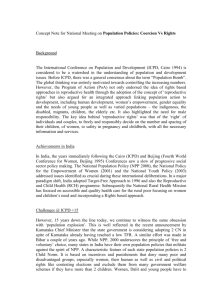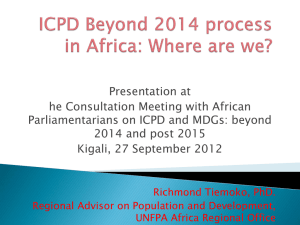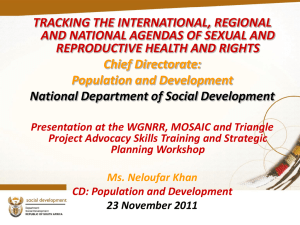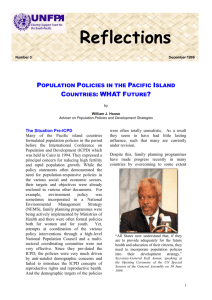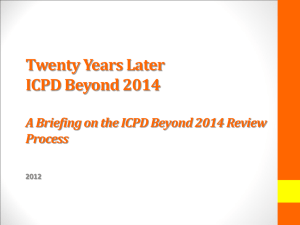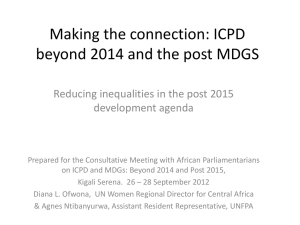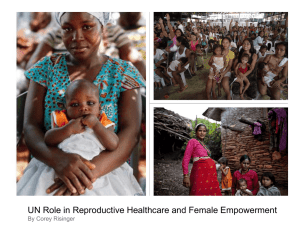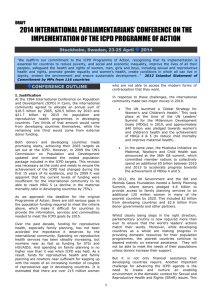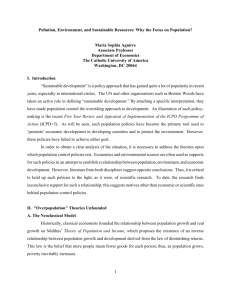IPCI 2012 - Istanbul Statement of Commitment
advertisement
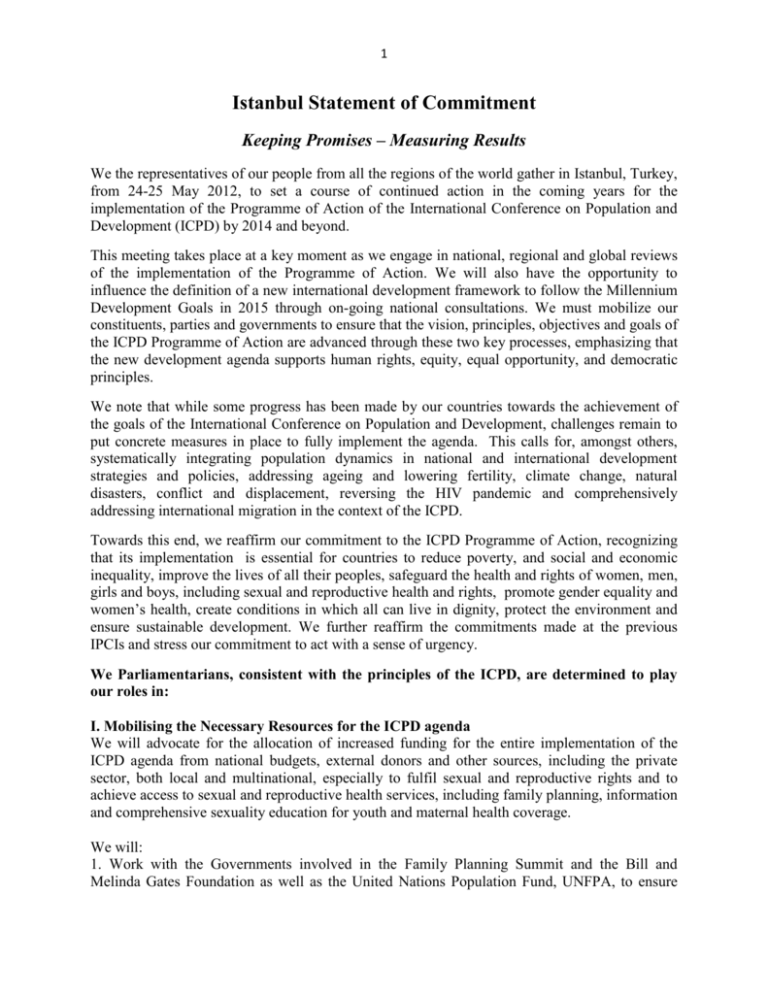
1 Istanbul Statement of Commitment Keeping Promises – Measuring Results We the representatives of our people from all the regions of the world gather in Istanbul, Turkey, from 24-25 May 2012, to set a course of continued action in the coming years for the implementation of the Programme of Action of the International Conference on Population and Development (ICPD) by 2014 and beyond. This meeting takes place at a key moment as we engage in national, regional and global reviews of the implementation of the Programme of Action. We will also have the opportunity to influence the definition of a new international development framework to follow the Millennium Development Goals in 2015 through on-going national consultations. We must mobilize our constituents, parties and governments to ensure that the vision, principles, objectives and goals of the ICPD Programme of Action are advanced through these two key processes, emphasizing that the new development agenda supports human rights, equity, equal opportunity, and democratic principles. We note that while some progress has been made by our countries towards the achievement of the goals of the International Conference on Population and Development, challenges remain to put concrete measures in place to fully implement the agenda. This calls for, amongst others, systematically integrating population dynamics in national and international development strategies and policies, addressing ageing and lowering fertility, climate change, natural disasters, conflict and displacement, reversing the HIV pandemic and comprehensively addressing international migration in the context of the ICPD. Towards this end, we reaffirm our commitment to the ICPD Programme of Action, recognizing that its implementation is essential for countries to reduce poverty, and social and economic inequality, improve the lives of all their peoples, safeguard the health and rights of women, men, girls and boys, including sexual and reproductive health and rights, promote gender equality and women’s health, create conditions in which all can live in dignity, protect the environment and ensure sustainable development. We further reaffirm the commitments made at the previous IPCIs and stress our commitment to act with a sense of urgency. We Parliamentarians, consistent with the principles of the ICPD, are determined to play our roles in: I. Mobilising the Necessary Resources for the ICPD agenda We will advocate for the allocation of increased funding for the entire implementation of the ICPD agenda from national budgets, external donors and other sources, including the private sector, both local and multinational, especially to fulfil sexual and reproductive rights and to achieve access to sexual and reproductive health services, including family planning, information and comprehensive sexuality education for youth and maternal health coverage. We will: 1. Work with the Governments involved in the Family Planning Summit and the Bill and Melinda Gates Foundation as well as the United Nations Population Fund, UNFPA, to ensure 2 that no new funding mechanisms are created for the resources to be made available for the family planning initiative in order to ensure scaling up of activities in commodity security, including influencing market mechanisms, social mobilization and strengthening health systems. 2. Engage both our executive bodies and donors to ensure resources for the implementation of the ICPD Programme of Action, and ensuring that funding is channelled in a coherent, coordinated, and transparent manner. 3. Strengthen our national, regional and global parliamentary networks and engage leaders of G8 and G20 countries to include in their agenda a review of the implementation of the commitments to women and children’s health at the G8 Summit in Muskoka, Canada in 2010. 4. Hold parliamentary hearings to assess the contributions of our Governments with a view to ensuring compliance with international commitments. 5. Include in the agenda of our parliaments an annual debate on trends and other factors related to and impacting funding for sexual and reproductive health and rights, including family planning. Furthermore, request reports, as part of the annual budget process, on measures to eliminate distortions in allocation of resources to various components of the ICPD agenda and ensure equity in the allocation of resources through the budget process and advocate for such outcomes in parliamentary debates. 6. Strive to attain at least 10 per cent of national development budgets and development assistance budgets for population and reproductive health programmes including HIV and AIDS prevention and especially, family planning and reproductive health commodities, and further ensure the target of 0.7 per cent of GNP for official development assistance is met. II. Strengthening Parliamentary Oversight in the Implementation of the ICPD agenda We commit to pass appropriate legislation, review existing legislation and mobilize strong support for laws consistent with the ICPD agenda as well as to monitor implementation and hold governments accountable, so that, such laws lead to sustainable development. We will: 1. Request relevant government bodies and civil society partners to map the areas of the ICPD that require legislative focus and hold hearings to identify the needs and interests of our communities in order to promote appropriate legislation. 2. Involve all relevant partners, especially civil society organizations, women, and youth, in the drafting of legislation on ICPD issues to ensure such laws reflect the broad spectrum of development needs of our peoples. 3. Hold hearings on the sexual and reproductive health and rights, including family planning, indicators, including coverage of services for various population groups, especially youth and vulnerable groups. Indicators should aim to assess the coverage of the range of services in the Programme of Action and the methods of data collection, including disaggregated data according 3 to geography, age, gender and socio-economic status, getting feedback from beneficiaries and communities and holding providers accountable. 4. Monitor and hold hearings to ensure that laws already passed are widely disseminated, implemented by the relevant institutions and are enforced by appropriate authorities. 5. Make those most in need a priority by making statements, guiding executive bodies on strategies to improve service accountability, including better programme supervision, detailed budget and resource tracking, suggested outcome measures, ombudsman/complaint mechanisms, civil society participation and reporting. III. Awareness raising, advocacy responsibilities and actions for results in priority areas: We commit to work with others in parliament and civil society to build a supportive legislative and enabling environment to: 1. Strengthen partnerships with other parliamentarians, donors, the United Nations system, local authorities, civil society organizations, (CSOs), community-based organizations (CBOs), and the private sector to leverage human and financial resources to achieve the ICPD Programme of Action and the MDGs, in particular MDG 3, 4, 5 and 6, including leveraging regional and global commitments such as the Maputo Plan of Action, Every Woman Every Child, the InterParliamentary Union resolution “Access to health as a basic right: the role of parliaments in addressing key challenges to securing the health of women and children”, and the resolutions of the Commission on Population and Development, including their recent consensus on youth and adolescents. 2. Ensure that sexual and reproductive health and rights, including family planning, are placed as key elements of the new international development agenda after 2015 and into all development and poverty reduction plans and policies, including the processes for Rio+20, ICPD Beyond 2014, Beijing+20 and the post–MDG UN development agenda. 3. Prioritize, where the situation requires, access to sexual and reproductive health services, including family planning services, women’s empowerment, elimination of harmful traditional practices, protection of reproductive rights, reforming school curricula to provide adolescents and youth with comprehensive sexuality education, data collection, adjusting planning processes to accommodate population dynamics and identify gaps that should be given priority attention. 4. Ensure that, consistent with the ICPD Programme of Action and the Key Actions for the Further Implementation of the Programme of Action of the ICPD, there is universal access to post abortion care, and access to safe abortion where not against the law. 5. Ensure particular focus on the following areas of the ICPD agenda that require the greatest attention: a) Empowering youth We will ensure that policies give urgent attention to the specific concerns and needs of the youth by promoting and protecting the rights of the youth to access good quality education at all levels, 4 health, sexual and reproductive health services, including comprehensive sexuality education, access to opportunities and productive employment and decent work. We will further create legislative and policy mechanisms to ensure meaningful and effective youth participation at all levels of our socio-political processes, empowering them to influence, implement, and evaluate national policy that affect their interests and their lives. We will include measures to prevent all types of exploitation and abuse against young people, including trafficking of young persons and economic, sexual, physical and mental abuse, child and forced marriages, and harmful traditional practices, and the elimination of discrimination against young pregnant girls. b) Promoting and protecting gender equality and the empowerment of women and girls We will work with others, including women’s and youth groups, to promote gender equality, equity and the empowerment of women and girls through the adoption and implementation of laws and policies that are based ın human rights documents, including the Convention on the Elimination of All forms of Discrimination against Women (CEDAW) as well as its Optional Protocol, the ICPD Programme of Action and the Beijing Platform for Action. We will ensure zero tolerance for all forms of violence against women and girls, including sexual violence, ensuring there is no impunity for acts of violence against women and girls, and that national programmes target men and boys to promote behavioural change and positive perceptions for achieving gender equality and equity in societies. c) Strengthening health systems: We will work with national authorities to ensure high quality, accessible, non-discriminatory, transparent health systems that prioritize the provision of and access to quality sexual and reproductive health services, commodities and supplies, in particular family planning services with modern methods of contraception, including emergency contraception. We will address the needs of youth for their sexual and reproductive health and reproductive rights and HIV prevention, target gender inequality in health care and develop and implement policies to ensure women’s equitable access to quality health services, through their life cycle and the full continuum of care. We will enact legislation to strengthen the monitoring of programme quality, efficiency and impacts to promote, support and allow programme adjustments and include the development and maintenance of health data collection systems. We will continue our efforts to ensure access to quality health services, including sexual and reproductive health services, family planning services, pregnancy and birth services including skilled birth attendants, antenatal and emergency obstetric care, post-natal and newborn care, and treatment and support for obstetric fistula and appropriate linkages between the services, including humanitarian emergencies, conflict and post-conflict situations, and refugee, returnee and migrant movements. We will ensure the allocation of resources for quality, skilled health workforce, including midwives, with high quality pre-service and in-service training, and a focus on staff retention, and engagement with local communities. 5 IV. Understanding and managing the politicisation of the ICPD agenda We will pay close attention to the efforts by any groups around the world to undermine the ICPD agenda, especially the right of individuals to determine their family sizes, women’s empowerment and gender equality, or linking population dynamics to poverty reduction, and providing information and education services to youths among others. We will: 1. Identify and understand the nature and origin of these anti-ICPD controversies and develop evidence based argument at country level to show their inadequacies and adverse effects on the wellbeing for all, including at regional and global levels, the sharing of experiences and models of how to successfully counter such opposition. V. Building Partnerships and Networking for the ICPD agenda We will expand partnerships with all relevant actors, including non-traditional partners in reproductive health and women’s rights, CSOs, academia, and CBOs to enhance implementation of the Cairo mandate. We will: 1. Utilize the opportunity of post-2014 and Post-2015 development processes to build a network of ICPD supporters, including for the national level multi-partner consultations to be undertaken by the UN Country Teams in at least 50 countries later this year to define the successor to the MDGs. 2. Engage in creating strategic partnerships and advocate for the effective role of parliament in national dialogues for the ICPD and MDG processes and work with other relevant actors to further implement the ICPD agenda and to ensure that ICPD perspectives are included in the future development frameworks. VI. Communication as a critical tool for forging shared understanding and cultivating public support on the ICPD agenda We will communicate the importance of the ICPD agenda to our political parties, electorate and fellow politicians. We will: 1. Actively encourage media interest in the implementation of the ICPD and support publications, hearings, events and media events for ICPD messaging. 2. Engage with media practitioners and identify the most effective ways of fostering support for the ICPD agenda. 3. Exchange among ourselves best practices in expanding supportive communications. 6 4. Promote the use of social media in expanding the interaction on the ICPD agenda and in generating partnerships and collaborations at national, regional and global level to ensure that Rio + 20 and the ICPD and MDG reviews result in a forward looking agenda. Pledge We commit to looking ahead to ensure that ICPD’s continuing and emerging priorities and concerns are reflected in the ICPD Beyond 2014 discussions and reporting, as well as ensuring that these issues of basic human development are included in the goals and targets being developed through the post-2015 development agenda processes. We call upon UNFPA to utilize the results of the global survey for the review of the ICPD beyond 2014 in preparation for the 2014 IPCI, including through a survey on actions taken by parliamentarians in implementation of the IPCI commitments. We further call upon the United Nations General Assembly to play a key role in building support for the ICPD Programme of Action, through policy instruments at the highest international level, moving its agenda forward into the future global framework for sustainable development to achieve measurable impact worldwide. We commit as parliamentarians, with respect to our responsibilities for legislation, analysis and advocacy for the implementation of the ICPD Programme of Action and for approving budgets, to hold ourselves accountable for reporting on the follow-up to the IPCI commitments. We Parliamentarians pledge to carry out these actions and to systematically and actively monitor the progress we make in doing so. We further pledge to report regularly on this progress through our regional parliamentary groups and to meet again in two years to assess the results we have achieved.
